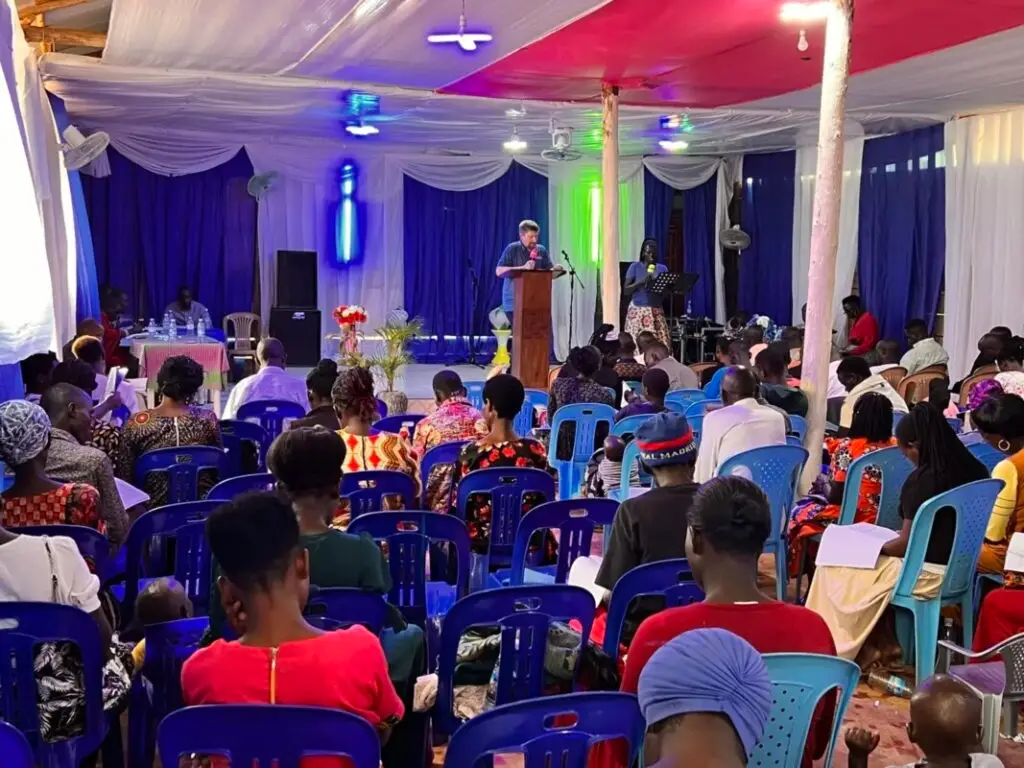Dr. Rhyne Putman, vice president for academic affairs at Williams Baptist University, leads a service in a rural village near Zirobwe, Uganda. (Submitted)
WALNUT RIDGE, Ark. (WBU news) – Dr. Rhyne Putman, vice president for academic affairs at Williams Baptist University and pastor of Mt. Zion Baptist Church in Walcott recently led a training event for new pastors and church planters in a rural village near Zirobwe, Uganda.
His mission was to impart essential theological knowledge to new pastors and church planters, who were eager to deepen their understanding of Christian doctrine and distinctive Baptist practices.
Over the course of two days, Putman led the nearly two hundred attendees through The Baptist Faith and Message 2000. Each attendee received a workbook that went line-by-line through the Southern Baptist statement of faith, covering relevant Scripture references along the way. The book was written in English and Luganda, the most widely spoken language in Uganda.
Putman wanted to explain the basics of Christian doctrine and distinctive Baptist practices to the group of nearly 200 attendees, some of whom came from Pentecostal and Seventh-day Adventist backgrounds.
“I saw my role like Priscilla and Aquila in Ephesus,” Putman said, “Many of these young men were like Apollos, ‘instructed in the way of the Lord’ and ‘fervent in spirit.’ While they were boldly sharing their faith with surrounding villages, they needed the way of God to be explained more accurately to them.”
Many of the church leaders in attendance were very new to the ministry.
“When I say that some of these pastors were a little green,” said Putman, “I met one pastor who had only been leading a church for six months, with no previous pastoral experience. Family members encouraged him to lead the church when the previous pastor moved to another village.”
“Upon hearing the explanation of what happens in conversion and the new birth, another young man who had been leading a ‘ministry’ in his village told me that he had never been truly born again,” Putman said, “and then publicly gave his life to Christ and committed to being discipled in the faith.”
The response from the attendees was overwhelmingly positive. After a day and a half of teaching with a translator, Putman opened up the floor for questions from the audience. He spent nearly three hours answering questions about doctrinal topics, biblical interpretation, Christian ethics, and church leadership.
“The men and women who were at this event had an insatiable hunger for God’s Word,” said Putman, “And they are asking the same kinds of questions in rural Uganda that Baptist university students in northeast Arkansas are asking.”
Many of the pastors at the event said that they would be taking the material based on the BFM2000 to their churches in an effort to explain what Baptist followers of Jesus believe and practice.
Putman said that he hopes more Arkansas Baptists can get involved in discipleship efforts like this one. He is especially hopeful that Arkansas churches would catch a vision for supporting worldwide theological education.
“Pastors are longing for training,” Putman said, “And they desperately want access to resources that American pastors take for granted, like Bible commentaries and sermon notes. Because of the excessive costs of shipping and customs taxes, we can’t ship them used books. But God has blessed us to live in a day and age where pastors can have electronic libraries if the funds are available to them.”
Roughly 84 percent of Ugandans identify as Christian, though Baptists account for less than 1 percent of that number.
WBU is a private, Christian university in Walnut Ridge.

